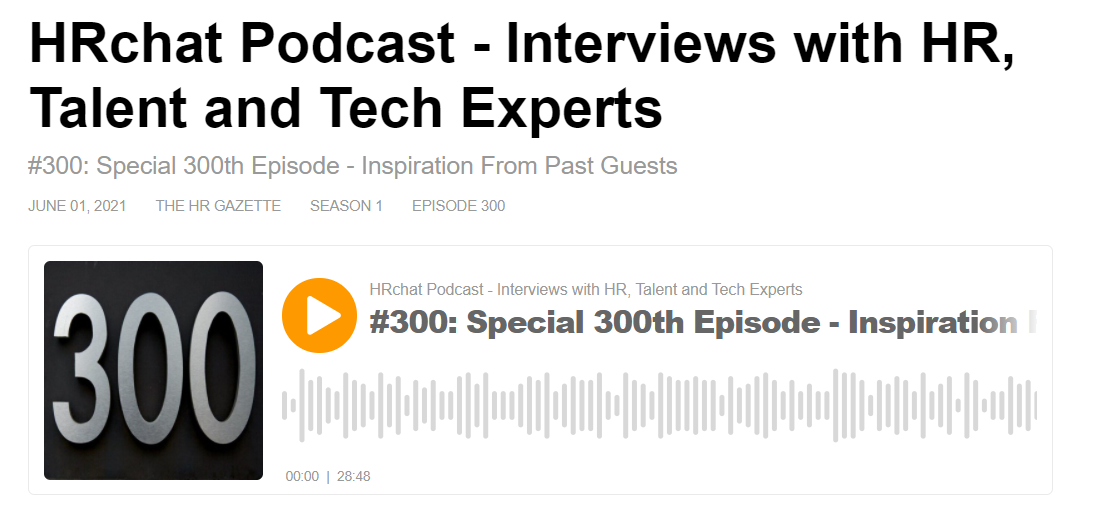
Today, we released HRchat episode 300! You know, back in 2016 when we started the podcast I would have thought you were kidding if you’d told me we’d reach such a huge milestone. More so given the caliber of guests and the depth of conversations we’ve had. The HRchat podcast has given me and guest hosts including Tim Baker and Matt Burns the opportunity to speak with, and learn from, some of the best minds in leadership, tech, talent, law, wellness, DEI, and Human Resources.
In the 299 episodes before this one, I and guest co-hosts such as Tim Baker and Matt Burns have interviewed global experts, leaders, and those in the HR trenches. Guests have been from brands such as NASA, SHRM, Government of Canada, Hacking HR, Ultimate Software, McLean & Company, RecruitingDaily, ADP, SAP, IBM, Deloitte Consulting LLP, Simon Sinek Inc, JDXpert, Constellation Research, Anchor HR, Unilever, JazzHR, Cegid, orgvue, Shopify, Culture Summit, DisruptHR, Talent Board, Virgin Pulse, Make-A-Wish Foundation, and Coca-Cola Beverages Company.
In episode 200 we celebrated by inviting the awesome, entertaining and super popular Steve Browne back on the show. Guests in the following 99 shows included Dr. Phillip Meade, Laura Tatham, Barry Flack, Pete Lamson, Janice Sutherland, Matt Charney, Christopher Bjorling, Ken Charman, Pauline James, Ray Wang, Gary Ware, Ivan Harding, Neil Lavis, Ben Eubanks, Glenn Donaldson, Laval Martin, Ben Geoghegan, Amy Kruglak, Dave Millner, Mark S. Babbitt, Elizebeth Varghese, Felicia Cheek, Lars Schmidt, Dr. Rochelle Haynes, Martin Hartshorne, Sona Khosla, Jerome Ternynck, Dr. David L. Katz, Dr. Dexter Shurney, Misa Nuccio, Bobby Humes, William Tincup, Samuel Isaac, Kevin Harrington, Mark Timm, Dr. Corey Olsen, Bill Boorman, Nancy Vitale, Jess Von Bank, Stephen Shefsky, Andy Spence, Tim Sackett, and Julie Wald.
Since our last milestone (episode 200 with Steve Browne) we have all experienced attrition, stress, uncertainty, and grief like never before in living witness. I, like so many of you out there, have recently suffered personal tragedy as a result of Covid.
HRchat episode 300, therefore is designed to be a happy show. A positive episode. A resource for you to get ideas and support that’ll set you up for success as many of us look to come out of the worst of the pandemic. E300 is a mixture of timely, insightful, and in many cases, optimistic responses from several of the guests who’ve appeared in the past century of HRchats.
HRchat Episode 300 Guests and Questions:
- Laila Tarraf – Lots of people are suffering from early or onset stress, anxiety, and depression at the moment as a result of the pandemic and everything that’s been thrown at employees. What insights would you have to share around how to use tragedy and attrition and turn that negative energy into something powerful and positive?
- Rob Bromage – How has thinking about high performance and leadership changed since Covid hit?
- Kelly Cooper – In terms of the HR function and corporate mandates, what has actually changed about Diversity, Equity, and Inclusion programs in the past year?
- Dr Ryan Todd – In times of adversity, what can leaders, employees, and HR pros learn in order to help them bolster resilience?
- Brian Kropp – One important thing that the pandemic taught us is that most employees are highly resilient, even in some of the most unexpected situations. However, their resilience has been challenged by their attempt to follow all rules, systems, and processes that companies put in place to ensure a high-efficiency level. While rules are needed, should organizations focus on those that support their employees, their culture, and their workplace instead of just sticking to rules for the sake of tradition?
- Bobby Umar – How can we manage and recover during challenging times?
- Suzanne Lucas AKA Evil HR Lady – There is an end in sight. Vaccines are being rolled out. What do you see as the main priorities for HR departments when it comes to facilitating a return to some degree of normality in the workplace?
- Jim Knight – What are the key organizational focal points leaders should address to amp up company culture? How have those tenants changed as a result of the Covid turmoil and socio-political changes we’ve faced recently?

